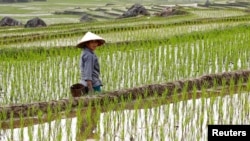Vietnam is now considering when it will resume exporting rice amid the coronavirus pandemic, after first saying Tuesday it was suspending the signing of any new rice contracts. The nation is the world’s third-largest rice exporter.
Authorities are reevaluating the situation because companies are saying there is plenty of rice in domestic storage, which the nation deemed a priority so citizens could stock up on food and stay at home to slow down the spread of the coronavirus.
The government formed a team to “work with local authorities and rice exporting companies to review, inspect and evaluate the supply of rice, the rice exporting conditions, the circulation of reserves and the status of executing rice export contracts,” it said on its official website Wednesday.
The Vietnam Food Association said it was safe to ship rice abroad, as domestic inventories are more than enough to serve local demand.
Agriculture professor Vo Tong Xuan agreed, saying the nation could export 3 million tons of rice while still maintaining food security. At the same time, Vietnam aims to have 190,000 tons in reserve for its own use, about the same amount as last year.
“Rice is still abundant in companies’ warehouses and right now the family farmers in the Mekong Delta are already harvesting it,” Xuan said in an interview with the state-run newspaper Tuoi Tre.
Not to allow exports could risk setting off a negative chain reaction that historically has been a counterproductive move.
That is what happened when India stopped exporting rice in 2008, knocking down a series of dominoes that led to other export bans and even rice rationing at Costco stores halfway around the world in the United States.
All of that happened despite the fact that there actually was a surplus of rice supplies. India, the biggest exporter of rice in the world, decided at the time to hold on to its domestic rice supply as part of a state initiative to ensure citizens had enough food. That scared other nations into thinking they had to hoard rice, too, and ban exports.
There was no real shortage of rice, but the collective action caused consumers to hoard rice because they saw prices rising, according to Princeton University economist Harrison Hong.
“You can call it survival instincts. You can call it speculative behavior. But people respond,” he said, after he and other academics studied consumer behavior in the crisis.
“Our findings suggest that one way to stabilize markets would be to basically promise households a certain ration of rice, which would reduce the fear of households about being able to obtain the food they need,” said Hong.
That is a reoccurring concern amid the COVID-19 pandemic. A few nations, such as Russia and Kazakhstan, have begun limiting their exports of food products. Vietnam’s suspension of rice shipments already has shown signs of impact elsewhere, including in Australia.
The virus outbreak’s impact on Vietnamese shopper confidence comes as locals already were starting to worry more about food, money and health, according to market researcher Nielsen Vietnam. The company’s managing director, Louise Hawley, said even before the coronavirus, her company’s survey from the last quarter of 2019 showed the Vietnamese were worried about the rising cost of food.
“An example of this has been the price of pork, as a result of African swine fever that has hit the pork industry and resulted in rising prices,” said Hawley.




